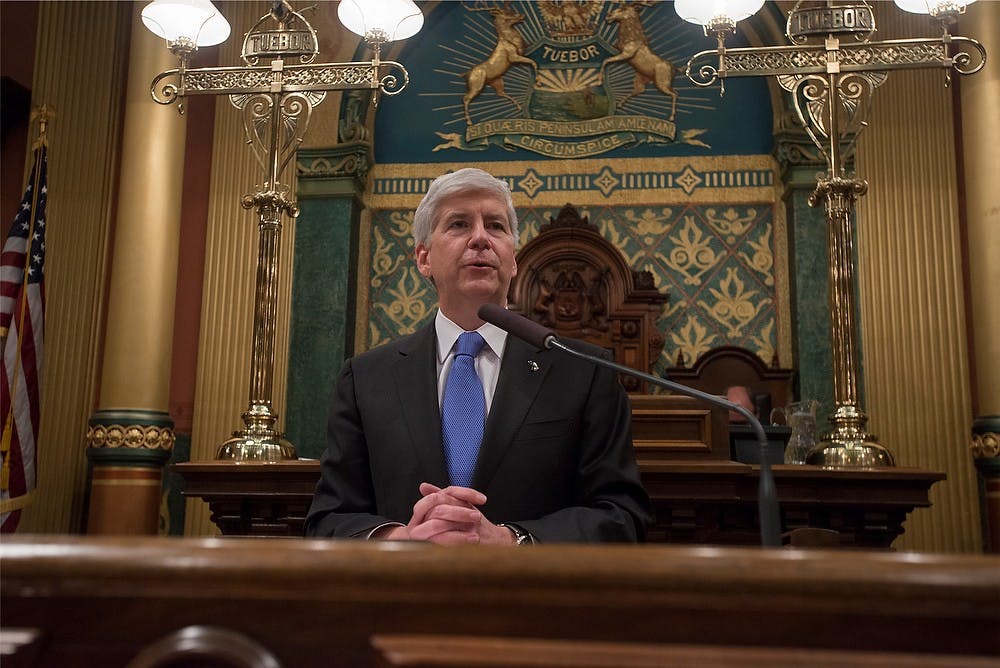Michigan prosecutors gave criminal charges to former state and Flint officials last week in the roles they played during the Flint water crisis, an environmental and anthropological catastrophe rooted in political discussions of saving money by switching Flint’s water source from the Detroit water system to the Flint River.
Yet, as these criminal cases pend, DeWaun Robinson, president of the Flint chapter of Black Lives Matter, said that Flint’s water still is not safe.
“It’s still unsafe,” Robinson said. “I don’t drink from the faucet. Nobody in the city of Flint drinks from the faucet.”
Robinson, who was born and raised in Flint and described himself as “a true Flintstone,” said that the crisis has been a “total hurt” for the entire community of Flint.
Former Director of the Michigan Department of Health and Human Services (MDHHS) Nicolas Lyon and former Chief Medical Executive of the MDHHS Eden Wells both face nine counts of involuntary manslaughter, but according to PBS FRONTLINE, at least 12 people have died from Legionnaires' disease caused by the Flint water, with potentially dozens of other undocumented deaths to go along with them.
Flint children were exposed to dangerous amounts of lead in the water, which according to the Centers for Disease Control and Prevention (CDC), can cause underdeveloped brain and nervous systems. Families encountered economic hardship in trying to live with restricted access to safe water.
For Robinson, though, he said the crisis took a psychological toll on himself, upon every other difficulty it brought.
“People are still dealing with the grips of being in crisis mode, and still trying to find answers, and still going through the daily reminder of this situation, and looking at it in media, and looking at it from maybe physical deformations on your skin or discoloration on your skin or your lost hair or your children may be affected mentally by the water and the lead in the water,” he said.
Of the most notorious of the figures being charged is Michigan ex-Gov. Rick Snyder, who has been dealt two counts of willful neglect of duty, accusations that come with a year in prison and/or a $1,000 fine each.
“That’s just like we say, like my good sister said — the former mayor of the city of Flint, Karen Weaver — ‘It’s like a slap in the face and a kick in the behind,’” Robinson said of Snyder’s charges. He said Snyder needs to be held more accountable for appointing some of the state officials who were involved in the case.
Johnie Franklin III, vice president of Flint’s Black Lives Matter, shared Robinson’s sentiment about the former head of the state when he said, “At the end of the day, he was one of the people that made a decision,” and that the charges against him are “unfair” for the people of Flint.
“It’s unfair," Franklin said. "It’s not right. I know people that passed away from it, people that have lead poisoning, kids that can’t even pass second, third grade because of this thing. And you affected thousands of people’s lives — I’m not saying that it’s all his fault, but it’s the team of people that were involved.”
For the people of Flint, Robinson said, many of them have lost trust in politicians, both at the state level and at the city level.
One of the parties being charged is former Director of the city of Flint Department of Public Works Howard Croft. Croft, like Snyder, faces two counts of willful neglect of duty. In a press release from the city of Flint that was sent to Snyder’s email on April 25, 2014, the day that Flint switched to the Flint River as a “temporary primary water source,” according to the release, Croft said, “The tests results have shown that our water is not only safe, but of the high quality that Flint customers have come to expect.”
MSU neuroscience and physiology sophomore Timothy Stokes, a native of Flint, said his water had become undrinkable, and although he said his family didn’t have it as bad as others, they were still hit hard. When it comes to justice, he said the answer gets iffy.
“There’s certain things that are irreparable,” Stokes said.
On Aug. 20, 2020, Michigan Attorney General Dana Nessel announced a $600 million settlement going to the people of Flint, with 79.5% of the amount going toward the children of Flint, according to a summary of the settlement.
Franklin and Stokes echoed the same thought about the settlement, saying that money is just money.
“You can’t really repair what’s been lost,” Stokes said.
“Even now for the settlement, it’s unfair,” Franklin said. “That’s not enough. Money can’t bring back people. Money can’t bring back happiness. It gives you a peace of mind a little bit, but it doesn’t take away the toll, the psychological toll, the emotional toll, the physical toll that has taken place. And a lot of people in the city have dealt with it harder than others. So, it’s just unfortunate that he’s (Snyder’s) only looking at like a year. And a lot of the blame does come from him. It comes from him for sure because he was the leader of the state, so you’re held accountable for these things.”
Support student media!
Please consider donating to The State News and help fund the future of journalism.
Discussion
Share and discuss “Flint BLM leaders, residents speak out regarding former Gov. Rick Snyder charges” on social media.







